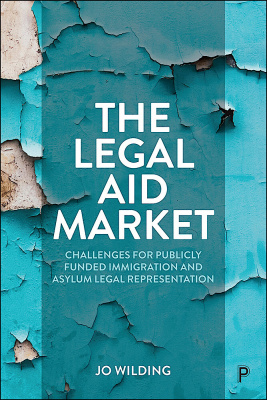Based on six years of empirical research, the book considers what has gone wrong in the legal aid market
A new book authored by Jo Wilding takes a detailed look at the immigration and asylum legal aid market in England and Wales. The book is based on six years of empirical research. It will, no doubt, be of considerable interest to many readers of EIN.
Wilding is a barrister at Garden Court Chambers and an Economic and Social Research Council (ESRC) postdoctoral fellow in the School of Applied Social Science at the University of Brighton.
 The book was published today by Policy Press at the University of Bristol and it can be ordered here (in hardback or as an ebook).
The book was published today by Policy Press at the University of Bristol and it can be ordered here (in hardback or as an ebook).
The blurb states: "Based on empirical research, this book offers fresh thinking on what has gone wrong in the legal aid market. It presents a rare picture of the barristers, solicitors and caseworkers practising immigration law in charities and private firms. In doing so, this book examines supply and demand and illuminates what constitutes high-quality legal aid work/provision, subsequent conflicts with financial rationality and how practitioners resolve these issues."
Daniel Newman, Senior Lecturer in Law at Cardiff University, calls the book essential reading for anyone looking to understand access to justice around immigration and asylum.
Professor Hilary Sommerlad of Leeds University says the book exposes a dysfunctional legal aid system that damages the most vulnerable in society.
In a blog post last week ahead of the publication of the book, Wilding called the current asylum system "callously dysfunctional". Against this, "underfunded legal aid lawyers offer the only meaningful resistance."
'Hostility' is a persistent thread running through the book, with Wilding noting that hostility is a driver of government policy in both immigration and in legal aid.
She says: "The nature, extent and background of the hostility to immigration are not examined in detail in this book … It will be argued, though, that this hostility often generates additional demand or need and creates dysfunctionality. As the UK slowly reckons with racism, it is important to recognise the racialised nature of its immigration laws and policies. It will require political courage to remove it. The hostility towards lawyers, or to broad conceptions of access to justice, can be seen in both political and media continents about lefty lawyers, state-funded Rottweilers, fat cat lawyers, a legal aid gravy train, and defendants being handed large sums of legal aid, constructing both lawyer and client as abusive, particularly in cases against the government itself."
Another key theme running through the book is what Wilding calls 'policy debris', caused by policy changing frequently due to wider trends in the organisation of government departments and in the regulation of legal professionals.
The book explains: "After the Carter Review in 2006, legal aid policy was set on a pathway towards Best-Value Tendering (BVT). This substantially shaped the policy decisions around fee structure, contracting, auditing, minimum quality standards, and so on. Rightly, BVT has been abandoned as a destination (for the most part), but the debris of that policy direction is still very much in evidence and is contributing to the dysfunctionality of the system."
The book takes a close-up look at some of the organisations and practitioners working in publicly funded immigration and asylum law, and it includes a look at widespread advice deserts and droughts in many areas of the country.
Wilding noted last week: "Already, large parts of England and almost all of Wales are advice deserts in which legal aid advice is unavailable. High-quality providers are compelled to reduce the amount of legal aid work they do in order to survive the fee levels and cope with the transaction costs. In fact, the legal aid funding and auditing regimes have the effect of driving down quality in the overall market, while the 'activist lawyers' the Home Secretary criticises fight to maintain the rule of law for some of the world's most vulnerable people."
Jo Wilding says the current asylum and legal aid system is "slow, hostile and traumatising" and it "does not work for applicants, legal aid lawyers, the Tribunals Service or the British taxpayer." In calling for reform, she argues in the book for a "whole-system perspective on legal aid, … which is informed by evidence and a detailed understanding of the participants in the market."
Also of interest are two earlier research reports by Jo Wilding on the same subject, which we covered on EIN in June 2019 here and in June 2021 here.